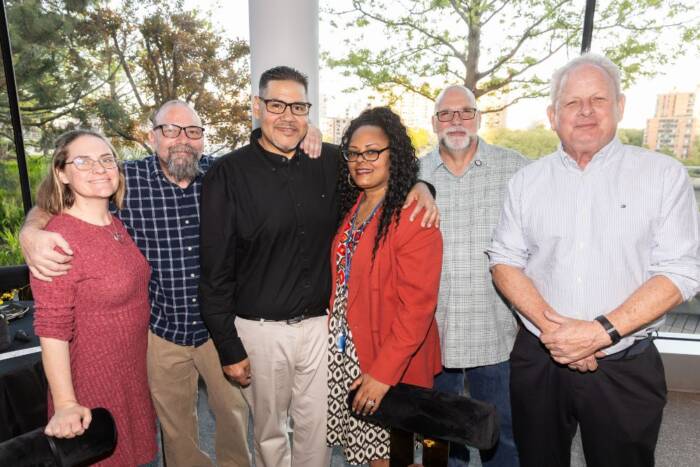RU mourns loss of Maclyn McCarty, scientist responsible for “pivotal discovery of 20th-century biology”
On Jan. 3, 2005, Rockefeller University President Paul Nurse informed the campus community about the death of Maclyn McCarty, one of the three Rockefeller scientists who in 1944 proved that DNA is the chemical basis for heredity. Following is Nurse’s e-mail to the campus.
Dear colleagues,
It is with deep sadness that I write to you about the passing of Maclyn McCarty, who died last evening at St. Luke’s Roosevelt Hospital. Mac, a beloved member of the Rockefeller University community, was 93.
In the 1940s, in association with Oswald Avery and Colin MacLeod, Mac made a fundamental breakthrough that launched the field of molecular biology. Their revolutionary findings, published in 1944 in the Journal of Experimental Medicine, provided the first evidence that DNA — a chemical previously thought to lack the necessary complexity — is in fact responsible for carrying hereditary information. Four decades later, Mac chronicled this landmark discovery in an inspiring and illuminating book, The Transforming Principle.
In 1994, Mac was awarded the Albert Lasker Award for Special Achievement in Medical Science for this research, which Josh Lederberg has called “the pivotal discovery of 20th-century biology.”
Beginning in 1946, when he became head of the Laboratory of Bacteriology and Immunology at Rockefeller, Mac tackled one of the dreaded diseases of the time, rheumatic fever. A malady that afflicts mostly children, rheumatic fever destroys the heart valve of both young and old. Mac launched an attack on the causative agent, the group A streptococcus.
Over the next four decades, through meticulous chemical analysis, he and his colleagues identified nearly every component that made up the streptococcal cell wall structure. Through his efforts and leadership in the field, the streptococcus remains today one of the best-characterized disease bacteria.
Mac McCarty held one of our John D. Rockefeller, Jr. Professorships. His service to Rockefeller included a 14-year tenure as physician-in-chief of The Rockefeller Hospital (1960 to 1974) and 13 years as a vice president (1965 to 1978). Outside of the university, Mac performed a vital service for the people of New York City as chairman of the Public Health Research Institute from 1985 to 1992. He also chaired the board of the Helen Hay Whitney Foundation for many years.
In 1963 he became an editor of the Journal of Experimental Medicine and continued, until recently, to come into his office in Bronk Laboratory and review manuscripts.
Among his many awards and honors, Mac was a member of the U.S. National Academy of Sciences and the Institute of Medicine. In 1982, he was granted an honorary degree by Rockefeller University and, in 2001, was presented with the David Rockefeller Award for Extraordinary Service at the Centennial Convocation. Mac held honorary doctorates from a number of other institutions, including Johns Hopkins and Harvard. He was also a recipient of the Wolf Prize in Medicine.
On behalf of the University, I express my deepest condolences to Mac’s wife, Marj, a cherished member of our community. We also express our sympathy to his sons, Richard McCarty and Colin Avery McCarty; and his daughter, Dale Dinunzio. Mac was friend and colleague to innumerable people on campus. He will be sorely missed.
Information about a service in Mac’s memory will be available in the coming days.
Paul Nurse


